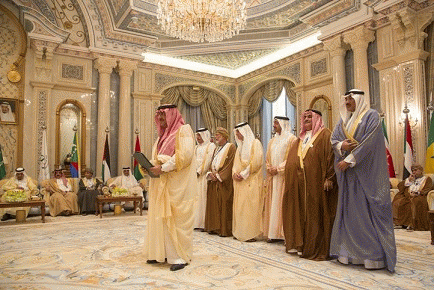Saudi Arabia's puzzling effort to blacklist its tiny neighbor Qatar begs the question of who's really isolated in the Gulf.
The splintering of the powerful Gulf Cooperation Council (GCC) into warring camps -- with Qatar, supported by Turkey and Iran, on one side, and Saudi Arabia, Bahrain, and the United Arab Emirates (UAE), supported by Egypt, on the other -- has less to do with disagreements over foreign policy and religion than with internal political and economic developments in the Middle East.
The ostensible rationale the GCC gave on June 4 for breaking relations with Qatar and placing the tiny country under a blockade is that Doha is aiding "terrorist" organizations. The real reasons are considerably more complex, particularly among the major players.
Middle East journalist Patrick Cockburn once described the Syrian civil war as a three-dimensional chess game with five players and no rules. In the case of the Qatar crisis, the players have doubled and abandoned the symmetry of the chessboard for go, mahjong, and bridge.
Saudi Insecurities
Tensions among members of the GCC are longstanding. In the case of Qatar, they date back to 1995, when the father of the current ruler, Emir Tamim Al Thani, shoved his own father out of power. According to Simon Henderson of the Washington Institute for Near East Policy, Saudi Arabia and the UAE "regarded the family coup as a dangerous precedent to Gulf ruling families" and tried to organize a counter coup. The coup was exposed, however, and called off.
Riyadh is demanding that Qatar sever relations with Iran -- an improbable outcome given that the two countries share a natural gas field in the Persian Gulf -- and end Doha's cozy ties to the Muslim Brotherhood. Indeed, if there's any entity in the Middle East that the Saudis hate -- and fear -- more than Iran, it's the Brotherhood. Riyadh was instrumental in the 2013 overthrow of the Brotherhood government in Egypt and has allied itself with the Israelis to marginalize Hamas, the Palestinian offshoot of the Brotherhood that dominates Gaza.
But fault lines in the GCC don't run only between Saudi Arabia, the UAE, and Qatar. Oman, at the Gulf's mouth, has always marched to its own drummer, maintaining close ties with Saudi Arabia's regional nemesis, Iran, and refusing to go along with Riyadh's war against the Houthi rebels in Yemen. Kuwait has also balked at Saudi dominance of the GCC, has refused to join the blockade against Doha, and is trying to play mediator in the current crisis.
The siege of Qatar was launched shortly after Donald Trump's visit to Saudi Arabia, when the Saudis put on a show for the U.S. president that was over the top even by the monarchy's standards. Wooed with massive billboards and garish sword dances, Trump soaked up the Saudi's view of the Middle East, attacked Iran as a supporter of terrorism, and apparently green-lighted the blockade of Qatar. He even tried to take credit for it.
Saudi Arabia, backed by Bahrain, Egypt, and the UAE, along with a cast of minor players, made 13 demands on Doha that it could only meet by abandoning its sovereignty. They range from the impossible (end all contacts with Iran) to the improbable (close a Turkish military base there) to the unlikely (dismantle the popular and lucrative media giant, Al Jazeera). The "terrorists" Doha is accused of supporting are the Brotherhood, which the Saudis and the Egyptians consider a terrorist organization, an opinion not shared by the U.S. or the European Union.
On the surface this is about Sunni Saudi Arabia vs. Shiite Iran. But while religious differences do play an important role in recruiting and motivating some of the players, this isn't a battle over a schism in Islam. Most importantly, it's not about "terrorism," since many of the countries involved are up to their elbows in supporting extremist organizations. Indeed, Saudi Arabia's reactionary Wahhabi interpretation of Islam is the root ideology for groups like the Islamic State and al-Qaeda, and all the parties are backing a variety of extremists in Syria and Libya's civil wars.
The attack on Qatar is part of Saudi Arabia's aggressive new foreign policy that is being led by Crown Prince and Defense Minister Mohammed bin Salman. As Saudi Arabia's "monarch in waiting," Mohammed has launched a disastrous war in Yemen that's killed more than 10,000 civilians and sparked a country-wide cholera epidemic there -- and which is draining at least $700 million a month from Saudi Arabia's treasury. Given the depressed price for oil and a growing population -- 70 percent of which is under 30 and much of it unemployed -- it's not a cost the monarchy can continue to sustain, especially with the Saudi economy falling into recession.
Underlying the Saudis' newfound aggression is fear. First, fear that the kind of Islamic governance modeled by the Muslim Brotherhood, which has elsewhere embraced elections and the democratic process, poses a threat to the absolutism of the Gulf monarchs. Fear that Iran's nuclear pact with the U.S., the EU, and the UN is allowing Tehran to break out of its economic isolation and turn itself into a rival power center in the Middle East. And fear that anything but a united front by the GCC -- led by Riyadh -- will encourage the House of Saud's internal and external critics.
Who's Really Isolated?
(Note: You can view every article as one long page if you sign up as an Advocate Member, or higher).






